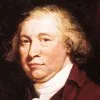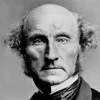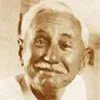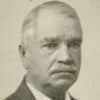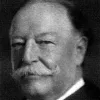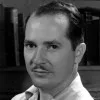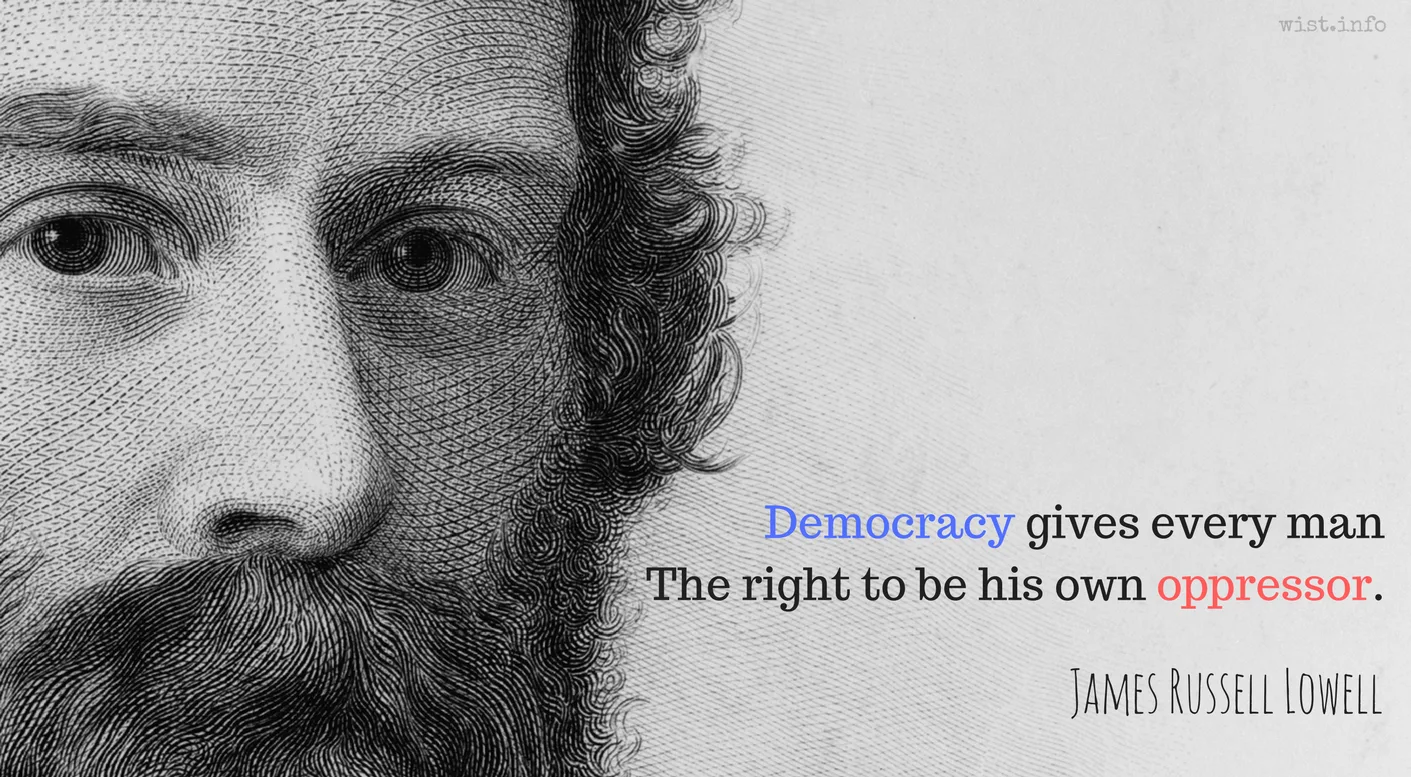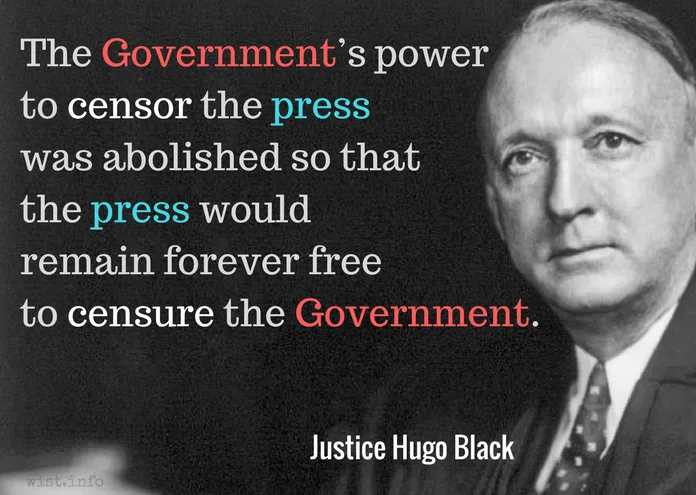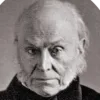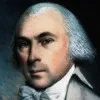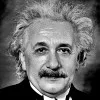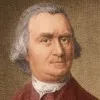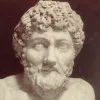MALCOLM: I think our country sinks beneath the yoke.
It weeps, it bleeds, and each new day a gash
Is added to her wounds.William Shakespeare (1564-1616) English dramatist and poet
Macbeth, Act 4, sc. 3, l. 49ff (4.3.49-51) (1606)
(Source)
Speaking with Macduff on the tyranny and bloodshed unleashed by Macbeth.
Quotations about:
tyranny
Note not all quotations have been tagged, so Search may find additional quotes on this topic.
All governments, democracies as well as autocracies, believe that those they seek to punish are guilty; the impediment of constitutional barriers are galling to all governments when they prevent the consummation of that just purpose. But those barriers were devised and are precious because they prevent that purpose and its pursuit from passing unchallenged by the accused, and unpurged by the alembic of public scrutiny and public criticism. A society which has come to wince at such exposure of the methods by which it seeks to impose its will upon its members, has already lost the feel of freedom and is on the path towards absolutism.
Learned Hand (1872-1961) American jurist
United States v. Coplon, 185 F.2d 629 (2d Cir. 1950) [majority opinion]
(Source)
At some time in the future, if the human mind becomes something totally different from what it is now, we may learn to separate literary creation from intellectual honesty. At present we know only that the imagination, like certain wild animals, will not breed in captivity.
George Orwell (1903-1950) English writer [pseud. of Eric Arthur Blair]
“The Prevention of Literature,” Polemic (1946-01)
(Source)
On the suppression of independent writers and writing in totalitarian statues, such as Germany and the Soviet Union, and the apathy of Western intelligentsia about it.
It is a stifling, stultifying world in which to live. It is a world in which every word and every thought is censored. In England it is hard even to imagine such an atmosphere. Everyone is free in England; we sell our souls in public and buy them back in private, among our friends. But even friendship can hardly exist when every white man is a cog in the wheels of despotism. Free speech is unthinkable. All other kinds of freedom are permitted. You are free to be a drunkard, an idler, a coward, a backbiter, a fornicator; but you are not free to think for yourself. Your opinion on every subject of any conceivable importance is dictated for you by the pukka sahibs’ code.
George Orwell (1903-1950) English writer [pseud. of Eric Arthur Blair]
Burmese Days, ch. 5 (1934)
(Source)
Of the life of the Englishman John Flory, the protagonist, in Burma, part of the 1920s British Raj. Orwell's first novel, it was based on his own experiences as a police officer in that part of the word. The pukka sahibs were the "excellent fellows," i.e., the European (white) colonialists of the region.
I have lived in one Reign, when the Prince, instead of invigorating the Laws of our Country, or giving them their proper Course, assumed a Power of dispensing with them: And in another, when the Sovereign was flattered by a Set of Men into a Persuasion, that the Regal Authority was unlimited and uncircumscribed. In either of these Cases, good Laws are at best but a dead Letter; and by shewing the People how happy they ought to be, only serve to aggravate the Sense of their Oppressions.
Joseph Addison (1672-1719) English essayist, poet, statesman
Essay (1715-12-26), The Freeholder, No. 2
(Source)
Nothing withstands the influence of wealth. Everything submits to its tyranny, everything cowers at its dominion.
[Οὐδὲν ὑφίσταται τὴν βίαν τοῦ πλούτου· Πάντα ὑποκύπτει τῇ τυραννίδι, πάντα ὑποπτήσσει τὴν δυναστείαν.]Basil of Caesarea (AD 330-378) Christian bishop, theologian, monasticist, Doctor of the Church [Saint Basil the Great, Ἅγιος Βασίλειος ὁ Μέγας]
“To the Rich [Ὁμιλία πρὸς τοὺς πλουτούντας],” sermon (c. 368) [tr. Schroeder (2009)]
(Source)
One day Lara went out and did not come back. She must have been arrested in the street, as so often happened in those days, and she died or vanished somewhere, forgotten as a nameless number on a list which was afterwards mislaid, in one of the innumerable mixed or women’s concentration camps in the north.
Boris Pasternak (1890-1960) Russian poet, novelist, and literary translator
Doctor Zhivago [До́ктор Жива́го], Part 2, ch. 15 “Conclusion,” sec. 17 (1955) [tr. Hayward & Harari (1958), UK ed.]
(Source)
Alternate translations:One day Larisa Feodorovna went out and did not come back. She must have been arrested in the street at that time. She vanished without a trace and probably died somewhere, forgotten as a nameless number on a list that afterwards got mislaid, in one of the innumerable mixed or women's concentration camps in the north.
[tr. Hayward & Harari (1958), US ed.]One day Larissa Fyodorovna left the house and did not come back again. Evidently she was arrested on the street in those days and died or vanished no one knew where, forgotten under some nameless number on subsequently lost lists, in one of the countless general or women’s concentration camps in the north.
[tr. Pevear & Volokhonsky (2010)]YEVGAF: (voice-over) One day she went away and didn't come back. I tried to trace her; but I couldn't. She must have been arrested in the street, as so often happened in those days, and she died or vanished somewhere, forgotten as a nameless number on a list which was afterward mislaid, in one of the innumerable mixed or women's concentration camps in the north.
[tr. Bolt (1965), film]
Fear of change is, no doubt, in all of us, but it most afflicts the man who fears that any change must lead to loss of his wealth and status. When this fear becomes inordinate, he will, if he has political power, abrogate such things as civil rights and the rule of law, using the argument that he abrogates them only to preserve them. In my own country, the government, in order to preserve Christian civilization, uses methods incompatible with Christianity and abrogates values which are essential to any civilization which calls itself Christian. If only a man would say, “I do this because I’m afraid,” one could bear it; but when he says, “I do this because I’m good,” that is a bit too much.
France was long a “Despotism tempered by Epigrams.”
Thomas Carlyle (1795-1881) Scottish essayist and historian
The French Revolution: A History, Part 1, Book 2, ch. 4 (1.2.4) (1837)
(Source)
Though given in quotation marks, Carlyle is apparently "quoting" himself.
This quotation is commonly given on its own, though, since Carlyle's thesis at this point in his history is that the royal government had largely become irrelevant in the nation, he continues:... and now, it would seem, the Epigrams have got the upper hand.
[Source]
Perish all they who love to dwell in cities
subject to Kings, or to the mighty few,
For Freedom’s an invaluable name,
and he who hath but little, here is rich.[κακῶς δ’ ὄλοιντο πάντες οἳ τυραννίδι
χαίρουσιν ὀλίγῃ τ’ ἐν πόλει μοναρχίᾳ·
τοὐλεύθερον γὰρ ὄνομα παντὸς ἄξιον,
κἂν σμίκρ’ ἔχῃ τις, μεγάλ’ ἔχειν νομιζέτω.]Euripides (485?-406? BC) Greek tragic dramatist
Auge [Αὐγῃ], fr. 275 (TGF) (c. 408 BC) [tr. Wodhall (1809)]
(Source)
Nauck frag. 275, Barnes frag. 10, Musgrave frag. 7. (Source (Greek)). Alternate translations:Pray that all who rejoice in tyranny,
Or in some small monarchy in their city, die terribly.
The name "freedom" is worth everything --
Even if he possesses a little, a man who has this is considered great.
[@sententiq (2015)]Worth above all is a name fit for the free.
[Source]
Among the lessons taught by the French Revolution, there is none sadder or more striking than this — that you may make everything else out of the passions of men except a political system that will work, and that there is nothing so pitilessly and unconsciously cruel as sincerity formulated into dogma.
James Russell Lowell (1819-1891) American diplomat, essayist, poet
“Abraham Lincoln” (1864), My Study Windows (1871)
(Source)
Doth any man assert that there are Gods
In Heaven? I answer there are none: let him
Who contradicts me like a fool, no longer
Quote ancient fables; but observe the fact,
Nor to my words give credence. Kings, I say.
Kill many, but rob more of their possessions.
And violating every sacred oath,
Lay waste whole cities; yet, tho’ they act thus,
Are more successful far than they who lead
In constant piety a tranquil life.[φησίν τις εἶναι δῆτ’ ἐν οὐρανῷ θεούς;
οὐκ εἰσίν, οὐκ εἴσ’, εἴ τις ἀνθρώπων θέλει
μὴ τῷ παλαιῷ μῶρος ὢν χρῆσθαι λόγῳ.
σκέψασθε δ’ αὐτοί, μὴ ἐπὶ τοῖς ἐμοῖς λόγοις
γνώμην ἔχοντες. φήμ’ ἐγὼ τυραννίδα
κτείνειν τε πλείστους κτημάτων τ’ ἀποστερεῖν
ὅρκους τε παραβαίνοντας ἐκπορθεῖν πόλεις·
καὶ ταῦτα δρῶντες μᾶλλόν εἰσ’ εὐδαίμονες
τῶν εὐσεβούντων ἡσυχῇ καθ’ ἡμέραν]Euripides (485?-406? BC) Greek tragic dramatist
Bellerophon [Βελλεροφῶν], frag. 286 (TGF) (c. 430 BC) [tr. Wodhull (1809)]
(Source)
Nauck (TGF) frag. 286, Barnes frag. 8, Musgrave frag. 25. (Source (Greek)). Alternate translations:Doth some one say that there be gods above?
There are not; no, there are not. Let no fool,
Led by the old false fable, thus deceive you.
Look at the facts themselves, yielding my words
No undue credence: for I say that kings
Kill, rob, break oaths, lay cities waste by fraud,
And doing thus are happier than those
Who live calm pious lives day after day. All divinity
Is built-up from our good and evil luck.
[tr. Symonds (1876)]Does someone say there are indeed gods in heaven? There are not, there are not, if a man is willing not to rely foolishly on the antiquated reasoning. Consider for yourselves, do not base your opinion on words of mine. I say myself that tyranny kills very many men and dprives them of their possessions; and that tyrants break their oaths to ransack cities, and in doing this they are more prosperous under heaven than men who live quietly in reverence.
[tr. Collard, Hargreaves, Cropp (1995)]Does anyone assert that there are gods in heaven? There are not, no, there are not, if a man is ready not to swallow whole the old tales. Think it through yourselves, do not make my words the foundation of your opinion. I declare that tyranny kills many, robs them, that tyrants break their oaths to plunder cities, yet in this they prosper more than those whose unassuming habit is true piety.
[tr. Stevens (2012)]Does anyone say there are gods in heaven? There are not, there are not, unless one wishes to follow ancient wisdom like a fool. [...] I say that tyranny kills many people, deprives possessions, circumvents oaths, and plunders cities. And even though they do these things, they are more fortunate than those living piously day to day in peace.
[tr. Dixon (2014)]Is there anyone who thinks there are gods in heaven?
There are not. There are not, for any man who wishes
Not to be a fool and trust some ancient story.
Look at it yourselves, don’t make up your mind
Because of my words. I think that tyranny
Kills so many men and steals their possessions
And that men break their oaths by sacking cities.
But the men who do such things are more fortunate
Than those who live each day piously, at peace.
[tr. @sentantiq (2015)]People ask: Do gods really exist in heaven? No, they do not exist, they really don’t; if any of mankind wishes to avoid being the sort of fool who follows the ancient story. Consider it for yourselves, don’t take my word for it. I say that tyranny destroys multitudes and confiscates their possessions; oath-breakers sack cities; and yet, those who do such things are far more prosperous than those who, day by day, live devoutly and in peace.
[tr. Emerson]
Were a historian like Tacitus to write a history of the best of our kings, giving an exact account of all the tyrannical acts and abuses of authority, the majority of which lie buried in the profoundest obscurity, there would be few reigns which would not inspire us with the same horror as that of Tiberius.
[Si un historien, tel que Tacite, eût écrit l’histoire de nos meilleurs rois, en faisant un relevé exact de tous les actes tyranniques, de tous les abus d’autorité, dont la plupart sont ensevelis dans l’obscurité la plus profonde, il y a peu de règnes qui ne nous inspirassent la même horreur que celui de Tibère.]
Nicolas Chamfort (1741-1794) French writer, epigrammist (b. Nicolas-Sébastien Roch)
Products of Perfected Civilization [Produits de la Civilisation Perfectionée], Part 1 “Maxims and Thoughts [Maximes et Pensées],” ch. 8, ¶ 482 (1795) [tr. Hutchinson (1902)]
(Source)
(Source (French)). Alternate translations:If such an historian as Tacitus had written the chronicle of our nobler kings, making an exact statement of all those tyrannical actions and abuses of authority which are now for the most part buried in deep darkness, few of their reigns would inspire less horror than that of Tiberius.
[tr. Mathers (1926)]If a historian such as Tacitus had written the histories of our best kings, with precise accounts of their tyrannical actions, and all their abuses of authority, most of which have been buried in the deepest obscurity, there are few reigns that would not arouse in us the same horror as that of Tiberius.
[tr. Merwin (1969)]If a chronicler such as Tacitus had written the history of our best kings, preparing an exact amount of all tyrannical acts, of all the abuses of authority, of which the majority are concealed by fathomless obscurity, there would be few reigns which would [not?] inspire us with the same horror as that of Tiberius.
[tr. Pearson (1973)]
Today most Americans seem to have forgotten the ancient evils which forced their ancestors to flee to this new country and to form a government stripped of old powers used to oppress them. But the Americans who supported the Revolution and the adoption of our Constitution knew firsthand the dangers of tyrannical governments. They were familiar with the long existing practice of English persecutions of people wholly because of their religious or political beliefs. They knew that many accused of such offenses had stood, helpless to defend themselves, before biased legislators and judges.
Hugo Black (1886-1971) American politician and jurist, US Supreme Court Justice (1937-71)
James Madison Lecture, NYU School of Law (1960-02-17)
(Source)
The inaugural Madison lecture. Reprinted as "The Bill of Rights," NYU Law Review, Vol. 35 (Apr 1960).
PERICLES: ‘Tis time to fear when tyrants seem to kiss.
William Shakespeare (1564-1616) English dramatist and poet
Pericles, Act 1, sc. 2, l. 86 (1.2.86) (1607) [with George Wilkins]
(Source)
The arguments of tyranny are as contemptible as its force is dreadful.
Edmund Burke (1729-1797) Anglo-Irish statesman, orator, philosopher
Reflections on the Revolution in France (1790)
(Source)
Let the rigour of a master over his slaves be applied by those who hold men under the empire of oppression; but they who rule by the principle of fear in a free state, practice a system of unparalleled madness. […] Let us therefore embrace that mode of conduct which has the most extensive influence, which contributes most, not only to the safety, but to the increase of wealth and power, and which rests, not upon fear, but upon the continuation of kind affections. — This is the method by which not only in private, but in public, we shall most easily obtain what we desire.
[Sed iis, qui vi oppresses imperio coercent, sit sane adhibenda saevitia, ut eris in famulos, si aliter teneri non possunt; qui vero in libera civitate ita se instruunt, ut metuantur, iis nihil potest esse dementius. […] Quod igitur latissime patet neque ad incolumitatem solum, sed etiam ad opes et potentiam valet plurimum, id amplectamur, ut metus absit, caritas retineatur. Ita facillime, quae volemus, et privatis in rebus et in re publica consequemur.]
Marcus Tullius Cicero (106-43 BC) Roman orator, statesman, philosopher
De Officiis [On Duties; On Moral Duty; The Offices], Book 2, ch. 7 (2.7) / sec. 24 (44 BC) [tr. McCartney (1798)]
(Source)
(Source (Latin)). Alternate translations:It is well enough in those who by open force have reduced any nation, and accordingly rule it with a high hand, if they do sometimes use rigour and severity, like masters towards their slaves when there is no other way of holding them in subjection: but for those who are magistrates in a free city, to endeavour to make themselves feared by the people, is one of the maddest and most desperate attempts on the face of the earth. [...] Let us therefore embrace and adhere to that method which is of the most universal influence, and serves not only to secure us what we have, but moreover to enlarge our power and authority; that is, in short, let us rather endeavour to be loved than feared, which is certainly the best way to make us successful, as well in our private as our public business.
[tr. Cockman (1699)]But the truth is, cruelty must be employed by those who keep others in subjection by force; as by a master to his slaves, if they cannot otherwise be managed. But of all madmen, they are the maddest who, in a free state so conduct themselves as to be feared. [...] We ought therefore to follow this most obvious principle, that dread should be removed and affection reconciled, which has the greatest influence not only on our security but also on our interest and power; and thus we shall most easily attain to the object of our wishes, both in private and political affairs.
[tr. Edmonds (1865)]Those who hold under their command subjects forcibly kept down must indeed resort to severity, as masters toward their slaves when they cannot otherwise be restrained. But nothing can be more mad than the policy of those who in a free state conduct themselves in such a way as to be feared. [...] Let us then embrace the policy which has the widest scope, and is most conducive, not to safety alone, but to affluence and power, namely, that by which fear may be suppressed, love retained. Thus shall we most easily obtain what we desire both in private and in public life.
[tr. Peabody (1883)]Let tyrants exercise cruelty, as a master does towards his slaves when he cannot control them by other means: but for a Citizen of a free State to equip himself with the weapons of intimidation is the height of madness. [...] Let us then put away fear and cleave to love; love appeals to every heart, it is the surest means of gaining safety, influence and power; in a word, it is the key to success both in private and in public life.
[tr. Gardiner (1899)]But those who keep subjects in check by force would of course have to employ severity -- masters, for example, toward their servants, when these cannot be held in control in any other way. But those who in a free state deliberately put themselves in a position to be feared are the maddest of the mad. [...] Let us, then, embrace this policy, which appeals to every heart and is the strongest support not only of security but also of influence and power -- namely, to banish fear and cleave to love. And thus we shall most easily secure success both in private and in public life.
[tr. Miller (1913)]Men who dominate and command other men, whom they have subjugated by force, have to apply some harshness, just as the owner uses harshness toward his slaves if he cannot control them any other way. But it is completely senseless for men in a free city act in such a way that it causes others to live in fear: no one could be more insane. [...] So let us embrace a rule that applies widely and that is extremely effective not only maintaining safety but also in acquiring wealth and power, namely, that there should be no fear, that one should hold affection dear. This is the easiest way for ust to attain what we want both in private affairs and in the government.
[tr. Edinger (1974)]
A State which dwarfs its men, in order that they may be more docile instruments in its hands even for beneficial purposes — will find that with small men no great thing can really be accomplished; and that the perfection of machinery to which it has sacrificed everything, will in the end avail it nothing, for want of the vital power which, in order that the machine might work more smoothly, it has preferred to banish.
John Stuart Mill (1806-1873) English philosopher and economist
On Liberty, ch. 5 “Applications” (1859)
(Source)
Closing words of the book.
Liberty, after she has been chained up awhile, is always more fierce, and sets her teeth in deeper, than she would otherwise have done if she had never been restrained.
[Acriores autem morsus sunt intermissae libertatis quam retentae.]
Marcus Tullius Cicero (106-43 BC) Roman orator, statesman, philosopher
De Officiis [On Duties; On Moral Duty; The Offices], Book 2, ch. 7 (2.7) / sec. 14 (44 BC) [tr. Cockman (1699)]
(Source)
(Source (Latin)). Alternate translations:And the inflictions of freedom interrupted, are more rigorous than if it had been retained.
[tr. McCartney (1798)]For the inflictions of liberty, when it has been suspended, are more severe than if it had been retained.
[tr. Edmonds (1865)]Men indeed feel more keenly the suppression of liberty than any evils incident to its preservation.
[tr. Peabody (1883)]Freedom, if suppressed, only bites with keener fang.
[tr. Gardiner (1899)]Freedom suppressed and again regained bites with keener fangs than freedom never endangered.
[tr. Miller (1913)]But the wounds caused by the suspension of freedom hurt worse than those caused by maintaining it.
[tr. Edinger (1974)]
You think that a wall as solid as the earth separates civilization from barbarism. I tell you the division is a thread, a sheet of glass. A touch here, a push there, and you bring back the reign of Saturn.
John Buchan (1875-1940) Scottish novelist, poet, and politician; Governor-General of Canada (1935 -1940)
The Power-House, ch. 3 (1916)
(Source)
Democratic institutions are quarantine arrangements to combat that ancient pestilence, lust for tyranny: as such they are very useful and very boring.
[Die demokratischen Einrichtungen sind Quarantäne-Anstalten gegen die alte Pest tyrannenhafter Gelüste: als solche sehr nützlich und sehr langweilig.]
Friedrich Nietzsche (1844-1900) German philosopher and poet
Human, All Too Human [Menschliches, Allzumenschliches], Vol. 2, Part 2 “The Wanderer and His Shadow [Der Wanderer und sein Schatten],” aphorism 289 (1880) [tr. Holingdale (1986)]
(Source)
(Source (German)). Alternate translations:Democratic institutions are centres of quarantine against the old plague of tyrannical desires. As such they are extremely useful and extremely tedious.
[tr. Cohn (1913)]Democratic institutions are quarantine mechanisms for that old pestilence, tyrannic lust. As such they are very useful and very boring.
But if war continues to absorb and dominate it, or if the itch to rule the world requires large military establishment and appropriation, the freedom of democracy may one by one succumb to the discipline of arms and strife. If race or class war divides us into hostile camps, changing political argument into blind hate, one side or the other may overturn the hustings with the rule of the sword. If our economy of freedom fails to distribute wealth as ably as it has created it, the road to dictatorship will be open to any man who can persuasively promise security to all; and a martial government, under whatever charming phrases, will engulf the democratic world.
William James (Will) Durant (1885-1981) American historian, teacher, philosopher
The Lessons of History, ch. 10 (1968) [with Ariel Durant]
(Source)
History shows that there is nothing so easy to enslave and nothing so hard to emancipate as ignorance, hence it becomes the double enemy of civilization. By its servility it is the prey of tyranny, and by its credulity it is the foe of enlightenment.
Lemuel K. Washburn (1846-1927) American freethinker, writer
Is the Bible Worth Reading? And Other Essays, Epigraph (1911)
(Source)
The nature of liberal democracy prevents propagandistic statements from being banned, since among the liberties it permits is the freedom of speech. But since humans have characteristic rational weaknesses and are susceptible to flattery and manipulation, allowing propaganda has a high likelihood of leading to tyranny, and hence to the end of liberal democracy.
Jason Stanley (b. 1969) American philosopher, epistemologist, academic
How Propaganda Works, ch. 1 (2015)
(Source)
If none of us is prepared to die for freedom, then all of us will die under tyranny.
Timothy Snyder (b. 1969) American historian, author
On Tyranny: Twenty Lessons from the Twentieth Century (2017)
(Source)
The liberty of man is not safe in the hands of any church. Wherever the Bible and sword are in partnership, man is a slave.
Robert Green Ingersoll (1833-1899) American lawyer, agnostic, orator
Some Mistakes of Moses, ch. 3 “The Politicians” (1879)
(Source)
Despotic authority attaches great importance to being considered strong, and much less to being admired for its wisdom. Besides, what does wisdom mean to a despot? It means skill in the use of power. The wise despot knows when and how to strike. This continual display of power is necessary because, at root, any dictatorship appeals to the lowest instincts of the governed: fear, aggressiveness toward one’s neighbors, bootlicking. Terror most effectively excites such instincts, and fear of strength is the wellspring of terror.
Ryszard Kapuściński (1932-2007) Polish journalist, photographer, poet, author
Shah of Shahs (1982)
(Source)
The most intelligent of the Nazis, the legal theorist Carl Schmitt, explained in clear language the essence of fascist governance. The way to destroy all rules, he explained, was to focus on the idea of the exception. A Nazi leader outmaneuvers his opponents by manufacturing a general conviction that the present moment is exceptional, and then transforming that state of exception into a permanent emergency. Citizens then trade real freedom for fake safety.
Timothy Snyder (b. 1969) American historian, author
On Tyranny: Twenty Lessons from the Twentieth Century, ch. 17 (2017)
(Source)
Tyrants thrive on cliché, on language that declares itself beyond questioning.
Gary Greenberg (b. c. 1939) American psychotherapist, author
“The Stories We Tell About Drinking,” The New Yorker (2 Apr 2018)
(Source)
The final mode is misplaced faith. It involves the sort of self-deifying claims the president made when he said that “I alone can solve it” or “I am your voice.” When faith descends from heaven to earth in this way, no room remains for the small truths of our individual discernment and experience. What terrified Klemperer was the way that this transition seemed permanent. Once truth had become oracular rather than factual, evidence was irrelevant. At the end of the war a worker told Klemperer that “understanding is useless, you have to have faith. I believe in the Führer.”
Timothy Snyder (b. 1969) American historian, author
On Tyranny: Twenty Lessons from the Twentieth Century (2017)
(Source)
A nationalist will say that “it can’t happen here,” which is the first step toward disaster. A patriot says that it could happen here, but that we will stop it.
Timothy Snyder (b. 1969) American historian, author
On Tyranny: Twenty Lessons from the Twentieth Century (2017)
(Source)
If lawyers had followed the norm of no execution without trial, if doctors had accepted the rule of no surgery without consent, if businessmen had endorsed the prohibition of slavery, if bureaucrats had refused to handle paperwork involving murder, then the Nazi regime would have been much harder pressed to carry out the atrocities by which we remember it.
Timothy Snyder (b. 1969) American historian, author
On Tyranny: Twenty Lessons from the Twentieth Century (2017)
(Source)
Be calm when the unthinkable arrives. Modern tyranny is terror management. When the terrorist attack comes, remember that authoritarians exploit such events in order to consolidate power. The sudden disaster that requires the end of checks and balances, the dissolution of political parties, the suspension of freedom of expression, the right to a fair trial, and so on, is the oldest trick in the Hitlerian book. DO NOT FALL FOR IT.
Timothy Snyder (b. 1969) American historian, author
On Tyranny: Twenty Lessons from the Twentieth Century (2017)
(Source)
People say we ought not to allow ourselves to be drawn into a theoretical antagonism between Nazidom and democracy; but the antagonism is here now. It is this very conflict of spiritual and moral ideas which gives the free countries a great part of their strength. You see these dictators on their pedestals, surrounded by the bayonets of their soldiers and the truncheons of their police. On all sides they are guarded by masses of armed men, cannons, aeroplanes, fortifications, and the like — they boast and vaunt themselves before the world, yet in their hearts there is unspoken fear. They are afraid of words and thoughts; words spoken abroad, thoughts stirring at home — all the more powerful because forbidden — terrify them. A little mouse of thought appears in the room, and even the mightiest potentates are thrown into panic. They make frantic efforts to bar our thoughts and words; they are afraid of the workings of the human mind. Cannons, airplanes, they can manufacture in large quantities; but how are they to quell the natural promptings of human nature, which after all these centuries of trial and progress has inherited a whole armoury of potent and indestructible knowledge?
Winston Churchill (1874-1965) British statesman and author
“The Defence of Freedom and Peace (The Lights are Going Out),” radio broadcast (16 Oct 1938)
(Source)
Where some possess much, and the others nothing, there may arise an extreme democracy, or a pure oligarchy; or a tyranny may grow out of either extreme.
Aristotle (384-322 BC) Greek philosopher
Politics [Πολιτικά], Book 4, ch. 11 / 1296a.1-3 [tr. Jowett (1885)]
(Source)
Alternate translations:
- "When some possess too much, and others nothing at all, the government must either be in the hands of the meanest rabble or else a pure oligarchy; or, from the excesses of both, a tyranny." [tr. Ellis (1912)]
- "Where some own a very great deal of property and others none there comes about either an extreme democracy or an unmixed oligarchy, or a tyranny may result from both of the two extremes." [tr. Rackham (1932)]
- "Where some possess very many things and others nothing, either rule of the people in its extreme form must come into being, or unmixed oligarchy, or -- as a result of both of these excesses -- tyranny." [tr. Reeve (2007)]
- "Where some people are very wealthy and others have nothing, the result will be either extreme democracy or absolute oligarchy, or despotism will come from either of those excesses."
It is also advantageous for a tyranny that all those who are under it should be oppressed with poverty, that they may not be able to compose a guard; and that, being employed in procuring their daily bread, they may have no leisure to conspire against their tyrants.
[καὶ τὸ πένητας ποιεῖν τοὺς ἀρχομένους τυραννικόν, ὅπως μήτε φυλακὴ τρέφηται καὶ πρὸς τῷ καθ᾽ ἡμέραν ὄντες ἄσχολοι ὦσιν ἐπιβουλεύειν.]
Aristotle (384-322 BC) Greek philosopher
Politics [Πολιτικά], Book 5, ch. 11 / 1313b.16 [tr. Ellis (1912)]
(Source)
Original Greek. Alternate translations:
- "Also he should impoverish his subjects; he thus provides against the maintenance of a guard by the citizen and the people, having to keep hard at work, are prevented from conspiring." [tr. Jowett (1885)]
- "And it is a device of tyranny to make the subjects poor, so that a guard may not be kept, and also that the people being busy with their daily affairs may not have leisure to plot against their ruler." [tr. Rackham (1932)]
- "It is also a feature of tyranny to make the ruled poor, so that they cannot sustain their own defense, and are so occupied with their daily needs that they lack the leisure to conspire." [tr. Lord (1984)]
- "It is also in the interests of a tyrant to make his subjects poor, so that he may be able to afford the cost of his bodyguard, while the people are so occupied with their daily tasks that they have no time for plotting."
But, of all motives, none is better adapted to secure influence and hold it fast than love; nothing is more foreign to that end than fear. […] For fear is but a poor safeguard of lasting power; while affection, on the other hand, may be trusted to keep it safe for ever.
[Omnium autem rerum nec aptius est quicquam ad opes tuendas ac tenendas quam diligi nec alienius quam timeri. … Malus enim est custos diuturnitatis metus contraque benivolentia fidelis vel ad perpetuitatem.]
Marcus Tullius Cicero (106-43 BC) Roman orator, statesman, philosopher
De Officiis [On Duties; On Moral Duty; The Offices], Book 2, ch. 7 (2.7) / sec. 23 (44 BC) [tr. Miller (1913)]
(Source)
Discussing the fate of tyrants such as Julius Caesar. Original Latin. Alternate translations:Now of all those methods, which tend to the advancement and maintenance of our interest, there is none more proper and convenient than love, and none more improper and inconvenient than fear. [...] For obedience, proceeding from fear, cannot possibly be lasting; whereas that which is the effect of love will be faithful for ever.
[tr. Cockman (1699)]Of all means there is none better fitted for supporting and retaining our influence than to be loved; or more foreign to it, than to be feared. [...] Fear is a false and short-lived security, but the love of men is faithful and lasting.
[tr. McCartney (1798)]Now, of all things there is none more adapted for supporting and retaining our influence than to be loved, nor more prejudicial than to be feared. [...] For fear is but a bad guardian to permanency, whereas affection is faithful even to perpetuity.
[tr. Edmonds (1865)]But of all things nothing tends so much to the guarding and keeping of resources as to be the object of affection; nor is anything more foreign to that end than to be the object of fear. [...] For fear is but a poor guardian for permanent possession, and, on the other hand, good will is faithful so long as there can be need of its loyalty.
[tr. Peabody (1883)]Of all the means of maintaining power, love is the best, the worst fear. [...] Fear is a poor guardian of lasting power; love will keep it safe for ever.
[tr. Gardiner (1899)]However, among all qualities there is no more appropriate way to preserve and defend one's resources than to be well-liked, nothing less appropriate than to be feared. [...] To arouse fear in others is a bad guarantee of longevity, while on the other hand good will is faithful unto eternity.
[tr. Edinger (1974)]
If everybody always lies to you, the consequence is not that you believe the lies, but rather that nobody believes anything any longer. This is because lies, by their very nature, have to be changed, and a lying government has constantly to rewrite its own history. On the receiving end you get not only one lie — a lie which you could go on for the rest of your days — but you get a great number of lies, depending on how the political wind blows. And a people that no longer can believe anything cannot make up its mind. It is deprived not only of its capacity to act but also of its capacity to think and to judge. And with such a people you can then do what you please.
Hannah Arendt (1906-1975) German-American philosopher, political theorist
Interview with Roger Errera (Oct 1973), The New York Review of Books (26 Oct 1978)
(Source)
Their guards also are such as are used in a kingly government, not a despotic one; for the guards of their kings are his citizens, but a tyrant’s are foreigners. The one commands, in the manner the law directs, those who willingly obey; the other, arbitrarily, those who consent not. The one, therefore, is guarded by the citizens, the other against them.
[οἱ γὰρ πολῖται φυλάττουσιν ὅπλοις τοὺς βασιλεῖς, τοὺς δὲ τυράννους ξενικόν: οἱ μὲν γὰρ κατὰ νόμον καὶ ἑκόντων οἱ δ᾽ ἀκόντων ἄρχουσιν, ὥσθ᾽ οἱ μὲν παρὰ τῶν πολιτῶν οἱ δ᾽ ἐπὶ τοὺς πολίτας ἔχουσι τὴν φυλακήν.]
Aristotle (384-322 BC) Greek philosopher
Politics [Πολιτικά], Book 3, ch. 14 / 1285a25 [tr. Ellis (1776)]
(Source)
Original Greek. Alternate translations:
- "The guard of the king is, for the same cause, one that belongs to a monarch and not to a tyrant, for the citizens protect their kings with their arms; but it is aliens who guard despots. For the former rule legally over willing subjects, the latter over unwilling; so that the former are guarded by their subjects, the latter against them." [tr. Bolland (1877)]
- "Wherefore also their guards are such as a king and not such as a tyrant would employ, that is to say, they are composed of citizens, whereas the guards of tyrants are mercenaries. For kings rule according to the law over voluntary subjects, but tyrants over involuntary; and the one are guarded by their fellow-citizens, the others are guarded against them." [tr. Jowett (1921)]
- "Also their bodyguard is of a royal and not a tyrannical type for the same reason; for kings are guarded by the citizens in arms, whereas tyrants have foreign guards, for kings rule in accordance with law and over willing subjects, but tyrants rule over unwilling subjects, owing to which kings take their guards from among the citizens but tyrants have them to guard against the citizens." [tr. Rackham (1944)]
- "For the same reason, their bodyguard is of a kingly rather than a tyrannical sort. For the citizens guard kings with their own arms, while a foreign element guards the tyrant, since the former rule willing persons in accordance wit the law, while the latter rule unwilling persons. So the ones have a bodyguard provided by the citizens, the other one that is directed against them." [tr. Lord (1984)]
- "And their bodyguards are kingly and not tyrannical due to the same cause. For citizens guard kings with their weapons, whereas a foreign contingent guards tyrants. For kings rule in accord with the law and rule voluntary subjects, whereas the latter rule involuntary ones, so that the former have bodyguards drawn from the citizens, whereas the latter have bodyguards to protect them against the citizens." [tr. Reeve (2007)]
- "Citizens guard their kings with arms; foreigners protect tyrants. This is because kings rule according to the law and with willing citizens while tyrants rule the unwilling. As a result, kings have guards from their subjects and tyrants keep guards against them." [tr. @sentantiq]
Indeed, just as frightened horses raise their necks up high, in the same way all those devotees of empty glory raise themselves above everything else, above cities, laws, ancestral custom, and the affairs of individual citizens. As they move from demagoguery to dictatorship, they subdue some of their neighbors as they try to make themselves superior and upright — and then they plan to enslave however so many minds remain naturally free and unenslaved.
[τῷ γὰρ ὄντι καθάπερ οἱ γαῦροι τῶν ἵππων τὸν αὐχένα μετέωρον ἐξάραντες, ὅσοι θιασῶται τῆς κενῆς δόξης εἰσίν, ἐπάνω πάντων ἑαυτοὺς ἱδρύουσι, πόλεων, νόμων, ἐθῶν πατρίων, τῶν παρ᾿ ἑκάστοις πραγμάτων· εἶτα ἀπὸ δημαγωγίας ἐπὶ δημαρχίαν βαδίζοντες καὶ τὰ μὲν τῶν πλησίον καταβάλλοντες, τὰ δὲ οἰκεῖα διανιστάντες καὶ παγίως ὀρθοῦντες, ὅσα ἐλεύθερα καὶ ἀδούλωτα φύσει φρονήματα]
Philo of Alexandria (AD c. 20-50) Hellenistic Jewish philosopher [Philo Judaeus]
On Dreams, That They Are God-Sent [Quod a Deo Mittantur Somnia or De Somniis], Book 2, ch. 12 [2.78-79] [tr. @sentantiq]
(Source)
Alt. trans.: "In real truth, as spirited horses lift their necks high, so all who are companions of vain opinion place themselves above all things, above all cities, and laws, and national customs, and above all the circumstances which affect each individual of them. Then proceeding onwards from being demagogues to being leaders of the people, and overthrowing the things which belong to their neighbours, and setting up and establishing on a solid footing what belongs to themselves, that is to say, all such dispositions as are free and by nature impatient of slavery, they attempt to reduce these also under their power." [Yonge (1855)]
The true art of government consists in not governing too much.
Jonathan Shipley (1714-1788) Clergyman in the Church in Wales
“A Sermon Preached Before the Incorporated Society for the Propagation of the Gospel in Foreign Parts,” St. Mary-Le-Bow, London (19 Feb 1773)
(Source)
Shipley believed that a lighter hand in the American colonies would make them want to remain with Britain, to the benefit of all parties.
Men cannot be made good by the state, but they can easily be made bad. Morality depends on liberty.
John Dalberg, Lord Acton (1834-1902) British historian, politician, writer
Note #10, in George Watson, Lord Acton’s History of Liberty (1994)
(Source)
Arbitrary power and the rule of the Constitution cannot both exist. They are antagonistic and incompatible forces; and one or the other must of necessity perish whenever they are brought in conflict.
George Sutherland (1862-1942) Anglo-American jurist, Supreme Court Justice (1922-1938)
Jones v. Securities & Exchange Commission 298 U.S. 1 (1936) [majority opinion]
(Source)
No honest, clear-headed man, however great a lover of popular government, can deny that the unbridled expression of the majority of a community converted hastily into law or action would sometimes make a government tyrannical and cruel. Constitutions are checks upon the hasty action of the majority. They are the self-imposed restraints of a whole people upon a majority of them to secure sober action and a respect for the rights of the minority.
William Howard Taft (1857-1930) US President (1909-13) and Chief Justice (1921-1930)
Veto Statement for the Arizona Enabling Act (15 Aug 1911)
(Source)
Taft vetoed the admission of Arizona to the US with a state constitution that allowed popular recall of judges.
I am a democrat because I believe in the Fall of Man. I think most people are democrats for the opposite reason. A great deal of democratic enthusiasm descends from the ideas of people like Rousseau, who believed in democracy because they thought mankind so wise and good that everyone deserved a share in government. The danger of defending democracy on those grounds is that they’re not true. And whenever their weakness is exposed, the people who prefer tyranny make capital out of the exposure. I find that they’re not true without looking further than myself. I don’t deserve a share in governing a hen-roost, much less a nation. Nor do most people — all the people who believe advertisements, and think in catchwords and spread rumours. The real reason for democracy is just the reverse. Mankind is so fallen that no man can be trusted with unchecked power over his fellows. Aristotle said that some people were only fit to be slaves. I do not contradict him. But I reject slavery because I see no men fit to be masters.
Anarchism is not a romantic fable but the hardheaded realization, based on five thousand years of experience, that we cannot entrust the management of our lives to kings, priests, politicians, generals, and county commissioners.
Edward Abbey (1927-1989) American anarchist, writer, environmentalist
A Voice Crying in the Wilderness, ch. 3 “Government and Politics” (1989)
(Source)
Because a body of men holding themselves accountable to nobody, ought not to be trusted by anybody.
Thomas Paine (1737-1809) American political philosopher and writer
The Rights of Man (1791)
(Source)
Nations are most commonly saved by the worst men in them. The virtuous are too scrupulous to go to the lengths which are necessary to rouse the people against their tyrants.
Horace Walpole (1717-1797) English novelist, letter writer
Memoirs of the Reign of King George III, Vol. 1, ch. 12 (1859)
(Source)
Variants:
- "The adventurer's career suggests the reflection that nations are usually saved by their worse men, since the virtuous are too scrupulous to go to the lengths needed to rouse the people against their tyrants." (Source)
- "The virtuous are too scrupulous to go to the lengths that are necessary to rouse the people against their tyrants."
- Modern paraphrase: "No great country was ever saved by good men because good men will not go to the lengths necessary to save it."
- Modern paraphrase: "No great country was ever saved by good men, because good men may not go to the lengths that may be necessary."
Let me point out to you that freedom is not something that anybody can be given; freedom is something people take and people are as free as they want to be. One hasn’t got to have an enormous military in order to be unfree when it’s simpler to be asleep, when it’s simpler to be apathetic, when it’s simpler, in fact, not to want to be free, to think that something else is more important.
James Baldwin (1924-1987) American novelist, playwright, activist
“Notes for a Hypothetical Novel,” speech, San Francisco College (22 Oct 1960)
(Source)
Later published in Nobody Knows My Name (1961).
Some people idealize force and pull it into the foreground and worship it, instead of keeping it in the background as long as possible. I think they make a mistake, and I think that their opposites, the mystics, err even more when they declare that force does not exist. I believe that it exists, and that one of our jobs is to prevent it from getting out of its box. It gets out sooner or later, and then it destroys us and all the lovely things which we have made. But it is not out all the time, for the fortunate reason that the strong are so stupid.
I endorse it. I think it was correct. Contrary to what many have said, it sought to outlaw neither prayer nor belief in god. In a pluralistic society such as ours, who is to determine what prayer shall be spoken and by whom? Legally, constitutionally or otherwise, the state certainly has no such right.
Martin Luther King, Jr. (1929-1968) American clergyman, civil rights leader, social activist, preacher
Playboy interview (Jan 1965)
(Source)
On the U.S. Supreme Court's decision to ban school-led prayer.
Experience declares that man is the only animal which devours its own kind; for I can apply no milder term to the governments of Europe, and to the general prey of the rich upon the poor.
Thomas Jefferson (1743-1826) American political philosopher, polymath, statesman, US President (1801-09)
Letter (1787-01-16) to Edward Carrington
(Source)
Whenever government assumes to deliver us from the trouble of thinking for ourselves, the only consequences it produces are those of torpor and imbecility.
William Godwin (1756-1836) English journalist, political philosopher, novelist
Enquiry Concerning Political Justice, Vol. 2, bk. 6, ch. 1 (1793)
(Source)
The capacity of the human mind for swallowing nonsense and spewing it forth in violent and repressive action has never yet been plumbed.
Robert A. Heinlein (1907-1988) American writer
“Concerning Stories Never Written” (Oct 1952)
(Source)
[T]here are historic situations in which refusal to defend the inheritance of a civilization, however imperfect, against tyranny and aggression may result in consequences even worse than war.
In the First Amendment, the Founding Fathers gave the free press the protection it must have to fulfill its essential role in our democracy. The press was to serve the governed, not the governors. The Government’s power to censor the press was abolished so that the press would remain forever free to censure the Government. The press was protected so that it could bare the secrets of government and inform the people. Only a free and unrestrained press can effectively expose deception in government. And paramount among the responsibilities of a free press is the duty to prevent any part of the government from deceiving the people and sending them off to distant lands to die of foreign fevers and foreign shot and shell.
Hugo Black (1886-1971) American politician and jurist, US Supreme Court Justice (1937-71)
New York Times Co. v. United States 403 U.S. 713, 717 (1971) [concurring]
(Source)
Ignorance is king. Many would not profit by his abdication. Many enrich themselves by means of his dark monarchy. They are his Court, and in his name they defraud and govern, enrich themselves and perpetuate their power. Even literacy they fear, for the written word is another channel of communication that might cause their enemies to become united. Their weapons are keen-honed, and they use them with skill. They will press the battle upon the world when their interests are threatened, and the violence which follows will last until the structure of society as it now exists is leveled to rubble, and a new society emerges. I am sorry: But that is how I see it.
Comfort and habits let us be ready to forgo, but I am not ready for a creed which does not care how much it destroys the liberty and security of daily life, which uses deliberately the weapons of persecution, destruction and international strife. How can I admire a policy which finds a characteristic expression in spending millions to suborn spies in every family and group at home, and to stir up trouble abroad?
The splendor of the goal of the French Revolution is simultaneously the source of our strength and of our weakness: our strength, because it gives us an ascendancy of truth over falsehood, and of public rights over private interests; our weakness, because it rallies against us all vicious men, all those who in their hearts seek to despoil the people . … It is necessary to stifle the domestic and foreign enemies of the Republic or perish with them. Now in these circumstances, the first maxim of our politics ought to be to lead the people by means of reason and the enemies of the people by terror. If the basis of popular government in time of peace is virtue, the basis of popular government in time of revolution is both virtue and terror: virtue without which terror is murderous, terror without which virtue is powerless. Terror is nothing else than swift, severe, indomitable justice; it flows, then, from virtue.
Maximilien Robespierre (1758-174) French lawyer, politician, revolutionary leader
Speech, National Convention (7 May 1794)
(Source)
In a parallel thought, he wrote in On the Principles of Political Morality (1794):
If virtue be the spring of a popular government in times of peace, the spring of that government during a revolution is virtue combined with terror: virtue, without which terror is destructive; terror, without which virtue is impotent. Terror is only justice prompt, severe and inflexible; it is then an emanation of virtue; it is less a distinct principle than a natural consequence of the general principle of democracy, applied to the most pressing wants of the country.
The tyrant grinds down his slaves and they don’t turn against him, they crush those beneath them.
Emily Brontë (1818-1848) British novelist, poet [pseud. Ellis Bell]
Wuthering Heights, ch. 11 [Heathcliff] (1847)
(Source)
The power to tax is the power to rule.
Brooks Atkinson (1894-1984) American drama critic and journalist
Once Around the Sun, “March 1” (1951)
(Source)
See also John Marshall.
It’s said that “power corrupts,” but actually it’s more true that power attracts the corruptible. The sane are usually attracted by other things than power. When they do act, they think of it as service, which has limits. The tyrant, though, seeks mastery, for which he is insatiable, implacable.
David Brin (b. 1950) American scientist and author
The Postman, ch. 14 (1985)
Often paraphrased: "It is said that power corrupts, but actually it's more true that power attracts the corruptible. The sane are usually attracted by other things than power." See Frank Herbert.
CATO: Content thyself to be obscurely good.
When vice prevails, and impious men bear sway,
The post of honour is a private station.Joseph Addison (1672-1719) English essayist, poet, statesman
Cato, Act 4, sc. 4, l. 139ff (1713)
(Source)
The jaws of power are always open to devour, and her arm is always stretched out, if possible, to destroy the freedom of thinking, speaking, and writing.
John Adams (1735-1826) American lawyer, Founding Father, statesman, US President (1797-1801)
“A Dissertation on the Canon and Feudal Law” (1765)
(Source)
The time to guard against corruption and tyranny is before they shall have gotten hold of us. It is better to keep the wolf out of the fold than to trust to drawing his teeth and talons after he shall have entered.
Thomas Jefferson (1743-1826) American political philosopher, polymath, statesman, US President (1801-09)
Notes on the State of Virginia, Query 13 (1782)
(Source)
Since the general civilization of mankind, I believe there are more instances of the abridgment of the freedom of the people by gradual and silent encroachments of those in power, than by violent and sudden usurpations.
I am inordinately proud these days of the quill, for it has shown itself, historically, to be the hypodermic which inoculates men and keeps the germ of freedom always in circulation, so that there are individuals in every time in every land who are the carriers, the Typhoid Mary’s, capable of infecting others by mere contact and example. These persons are feared by every tyrant — who shows his fear by burning the books and destroying the individuals.
We all know that books burn — yet we have the greater knowledge that books cannot be killed by fire. People die, but books never die. No man and no force can abolish memory. No man and no force can put thought in a concentration camp forever. No man and no force can take from the world the ideas that embody man’s eternal fight against tyranny of every kind. In this war, we know, books are weapons.
Franklin Delano Roosevelt (1882-1945) American lawyer, politician, statesman, US President (1933-1945)
Letter (1942-04-23), “Message to American Booksellers Association,” Annual Banquet (1942-05-06), Astor Hotel, New York City
(Source)
The letter was delivered with a speech by Archibald MacLeish (appointed by Roosevelt as Librarian of Congress, 1939-1944) titled "A Free Man's Books." This was shortly after FDR named April 17 as "Victory Book Day".
This quotation was turned into a poster by S. Broder, published by the US Office of War Information in 1942.
Under a tyranny, most friends are a liability. One quarter of them turn “reasonable” and become your enemies, one quarter are afraid to speak, and one quarter are killed and you die with them. But the blessed final quarter keep you alive.
Equality, rightly understood, as our founding fathers understood it, leads to liberty and to the emancipation of creative differences. Wrongly understood, as it has been so tragically in our time, it leads first to conformity and then to despotism.
Those who seek absolute power, even though they seek it to do what they regard as good, are simply demanding the right to enforce their own version of heaven on earth. And let me remind you, they are the very ones who always create the most hellish tyrannies. Absolute power does corrupt, and those who seek it must be suspect and must be opposed.
If an autocracy does not rest on the army, which leads to the chaos of praetorianism, it must rely on ‘panem et circenses.’ Hence it has some of the worst faults of democracy, without its advantages.
POLLY PEACHUM: The law is simply and solely made for the exploitation of those who do not understand it or of those who, for naked need, cannot obey it.
Whatever crushes individuality is despotism, by whatever name it may be called and whether it professes to be enforcing the will of God or the injunctions of men.
John Stuart Mill (1806-1873) English philosopher and economist
On Liberty, ch. 3 “Of Individuality, as One of the Elements of Well-Being” (1859)
(Source)
Find out just what any people will quietly submit to, and you have found out the exact amount of injustice and wrong which will be imposed upon them; and these will continue till they are resisted with either words or blows, or with both. The limits of tyrants are prescribed by the endurance of those whom they oppress.
No tendency is quite so strong in human nature as the desire to lay down rules of conduct for other people.
I believe any man who takes the liberty of another into his keeping is bound to become a tyrant, and that any man who yields up his liberty, in however slight the measure, is bound to become a slave.
Every successful revolution puts on in time the robes of the tyrant it has deposed.
Barbara W. Tuchman (1912-1989) American historian and author
Stilwell and the American Experience in China, 1911-1945, ch. 8 (1972)
(Source)
I am more and more convinced that man is a dangerous creature; and that power, whether vested in many or a few, is ever grasping, and, like the grave, cries, “Give, give!” The great fish swallow up the small; and he who is most strenuous for the rights of the people, when vested with power, is as eager after the prerogatives of government. You tell me of degrees of perfection to which human nature is capable of arriving, and I believe it, but at the same time lament that our admiration should arise from the scarcity of the instances.
The Bill of Rights was designed trustfully to prohibit forever two of the favorite crimes of all known governments: the seizure of private property without adequate compensation and the invasion of the citizen’s liberty without justifiable cause and due process.
The welfare of the people in particular has always been the alibi of tyrants, and it provides the further advantage of giving the servants of tyranny a good conscience. It would be easy, however, to destroy that good conscience by shouting to them: if you want the happiness of the people, let them speak out and tell what kind of happiness they want and what kind they don’t want! But, in truth, the very ones who make use of such alibis know they are lies; they leave to their intellectuals on duty the chore of believing in them and of proving that religion, patriotism, and justice need for their survival the sacrifice of freedom.
Albert Camus (1913-1960) Algerian-French novelist, essayist, playwright
“Homage to an Exile” (1955)
Published as an essay in Actuelles III, originally a speech (7 Dec 1955) at a banquet in honor of President Eduardo Santos, editor of El Tiempo, driven out of Columbia by a dictatorship". Reprinted in Resistance, Rebellion, and Death (1960).
Un-American activity cannot be prevented or routed out by employing un-American methods; to preserve freedom we must use the tools that freedom provides.
That all history shows the necessity, in order to the preservation of liberty, of every subjects having a watchful eye on the conduct of Kings, Ministers, and Parliament, and of every subjects being not only secured, but encouraged in alarming his fellow subjects on occasion of every attempt upon public liberty.
James Burgh (1714-1775) British politician and writer
Political Disquisitions, Book 1 “Of Government, briefly,” ch. 9 “Of the Liberty of Speech and Writing on Political Subjects” (1774)
(Source)
But, such is the perverse disposition of man, the most unruly of all animals, that this most useful institution has been generally debauched into an engine of oppression and tyranny over those, whom it was expressly and solely established to defend. And to such a degree has this evil prevailed, that in almost every age and country, the government has been the principal grievance of the people, as appears too dreadfully manifest, from the bloody and deformed pages of history. For what is general history, but a view of the abuses of power committed by those, who have got it into their hands, to the subjugation, and destruction of the human species, to the ruin of the general peace and happiness, and turning the Almighty’s fair and good world into a butchery of its inhabitants, for the gratification of the unbounded ambition of a few, who, in overthrowing the felicity of their fellow-creatures, have confounded their own?
James Burgh (1714-1775) British politician and writer
Political Disquisitions, Book 1 “Of Government, briefly,” ch. 1 (1774)
(Source)
If I had to choose, I should detest the tyranny of one man less than that of many. A despot always has his good moments; an assembly of despots never.
Voltaire (1694-1778) French writer [pseud. of Francois-Marie Arouet]
Philosophical Dictionary, “Tyranny” (1764) [tr. Gay (1962)]
(Source)
Power always Sincerely, conscientiously, de très bon foi, believes itself Right. Power always thinks it has a great Soul and vast Views, beyond the Comprehension of the Weak; and that it is doing God Service when it is violating all his Laws.
John Adams (1735-1826) American lawyer, Founding Father, statesman, US President (1797-1801)
Letter to Thomas Jefferson (2 Feb 1816)
(Source)
de très bon foi = "very candidly"
If there is no willingness to use force to defend civil society, it’s civil society that goes away, not force.
Teresa Nielsen Hayden (b. 1956) American editor, writer, essayist
Making Light, “Commonplaces”
(Source)
While the earnings of a minority are growing exponentially, so too is the gap separating the majority from the prosperity enjoyed by those happy few. This imbalance is the result of ideologies which defend the absolute autonomy of the marketplace and financial speculation. Consequently, they reject the right of states, charged with vigilance for the common good, to exercise any form of control. A new tyranny is thus born, invisible and often virtual, which unilaterally and relentlessly imposes its own laws and rules.
Francis I (b. 1936) Argentinian Catholic Pope (2013- ) [b. Jorge Mario Bergoglio]
Evangelii Gaudium, sec. 56 (24 Nov 2013)
(Source)
G’KAR: No dictator, no invader, can hold an imprisoned population by the force of arms forever. There is no greater power in the universe than the need for freedom. Against that power, governments, and tyrants, and armies can not stand.
Liberty is meaningless where the right to utter one’s thoughts and opinions has ceased to exist. That, of all rights, is the dread of tyrants. It is the right which they first of all strike down. They know its power. Thrones, dominions, principalities, and powers, founded in injustice and wrong, are sure to tremble, if men are allowed to reason of righteousness, temperance, and of a judgment to come in their presence.
Frederick Douglass (1817-1895) American abolitionist, orator, writer
“A Plea for Freedom of Speech in Boston,” speech (9 Dec 1860)
(Source)
Mankind are apt to be strongly prejudiced in favor of whatever is countenanced by antiquity, enforced by authority, and recommended by custom. The pleasure of acquiescing in the decision of others is by most men so preferred to the toil and hazard of inquiry, and so few are either able or disposed to examine for themselves, that the voice of law will generally be taken for the dictates of justice.
I think that if the beast who sleeps in man could be held down by threats — any kind of threat, whether of jail or of retribution after death — then the highest emblem of humanity would be the lion tamer in the circus with his whip, not the prophet who sacrificed himself. But don’t you see, this is just the point — what has for centuries raised man above the beast is not the cudgel but an inward music: the irresistible power of unarmed truth, the powerful attraction of its example.
Boris Pasternak (1890-1960) Russian poet, novelist, and literary translator
Doctor Zhivago [До́ктор Жива́го], Part 1, ch. 2 “A Girl from a Different World” [Nikolai] (1955) [tr. Hayward & Harari (1958), US ed.]
(Source)
Alternate translations:I think that if the beast who sleeps in man could be held down by threats -- any kind of threat, whether of jail or of retribution after death -- then the highest emblem of humanity would be the lion tamer in the circus with his whip, not the self-sacrificing preacher. But don’t you see, this is just the point -- what has for centuries raised man above the beast is not the cudgel but an inward music: the irresistible power of unarmed truth, the attraction of its example.
[tr. Hayward & Harari (1958), UK ed.]I think that if the beast who sleeps in man could be held down by threats -- any kind of threat, whether of jail or of retribution after death -- then the highest emblem of humanity would be the lion tamer in the circus with his whip, not the prophet who sacrificed himself. But this is just the point -- what has for centuries raised man above the beast is not the cudgel, but an inward music -- the irresistible power of unarmed truth.
[tr. Hayward & Harrai (1958); edited version quoted by Ronald Reagan, Moscow State University (1988-05-31)]I think that if the beast dormant in man could be stopped by the threat of, whatever, the lockup or requital beyond the grave, the highest emblem of mankind would be a lion tamer with his whip, and not the preacher who sacrifices himself. But the point is precisely this, that for centuries man has been raised above the animals and borne aloft not by the rod, but by music: the irresistibility of the unarmed truth, the attraction of its example.
[tr. Pevear & Volokhonsky (2010), "A Girl from a Different Circle"]
It is bad to be oppressed by a minority, but it is worse to be oppressed by a majority. For there is a reserve of latent power in the masses which, if it is called into play, the minority can seldom resist.
John Dalberg, Lord Acton (1834-1902) British historian, politician, writer
Speech (1877-02-28), “The History of Freedom in Antiquity,” Bridgenorth Institute
(Source)
CAESAR: Let me have men about me that are fat;
Sleek-headed men and such as sleep o’ nights:
Yon Cassius has a lean and hungry look;
He thinks too much; such men are dangerous.
Take the most radical revolutionist and place him upon the all-Russian throne or give him dictatorial power, for which so many of our green revolutionists daydream, and within a year he will have become worse than the Emperor himself.
Prudence, indeed, will dictate that Governments long established should not be changed for light and transient causes; and accordingly all experience hath shewn, that mankind are more disposed to suffer, while evils are sufferable, than to right themselves by abolishing the forms to which they are accustomed. But when a long train of abuses and usurpations, pursuing invariably the same Object evinces a design to reduce them under absolute Despotism, it is their right, it is their duty, to throw off such Government, and to provide new Guards for their future security.
Thomas Jefferson (1743-1826) American political philosopher, polymath, statesman, US President (1801-09)
“Declaration of Independence” (1776-07-04)
(Source)
As modified and approved by the Continental Congress. Jefferson's "original rough draft" is very similar:Prudence indeed will dictate that governments long established should not be changed for light & transient causes: and accordingly all experience hath shewn that mankind are more disposed to suffer while evils are sufferable, than to right themselves by abolishing the forms to which they are accustomed. but when a long train of abuses & usurpations, begun at a distinguished period, & pursuing invariably the same object, evinces a design to subject them to arbitrary power, it is their right, it is their duty, to throw off such government & to provide new guards for their future security.
Gentlemen, you can never make me believe — no statute can ever convince me, that there is any infinite Being in this universe who hates an honest man. It is impossible to satisfy me that there is any God, or can be any God, who holds in abhorrence a soul that has the courage to express his thought. Neither can the whole world convince me that any man should be punished, either in this world or in the next, for being candid with his fellow-men. If you send men to the penitentiary for speaking their thoughts, for endeavoring to enlighten their fellows, then the penitentiary will become a place of honor, and the victim will step from it — not stained, not disgraced, but clad in robes of glory.
Robert Green Ingersoll (1833-1899) American lawyer, agnostic, orator
Trial of C.B. Reynolds for blasphemy (May 1887)
(Source)
What is blasphemy? I will give you a definition; I will give you my thought upon this subject. What is real blasphemy?
To live on the unpaid labor of other men — that is blasphemy.
To enslave your fellow-man, to put chains upon his body — that is blasphemy.
To enslave the minds of men, to put manacles upon the brain, padlocks upon the lips — that is blasphemy.
To deny what you believe to be true, to admit to be true what you believe to be a lie — that is blasphemy.
To strike the weak and unprotected, in order that you may gain the applause of the ignorant and superstitious mob — that is blasphemy.
To persecute the intelligent few, at the command of the ignorant many — that is blasphemy.
To forge chains, to build dungeons, for your honest fellow-men — that is blasphemy.
To pollute the souls of children with the dogma of eternal pain — that is blasphemy.
To violate your conscience — that is blasphemy.
The jury that gives an unjust verdict, and the judge who pronounces an unjust sentence, are blasphemers.
The man who bows to public opinion against his better judgment and against his honest conviction, is a blasphemer.Robert Green Ingersoll (1833-1899) American lawyer, agnostic, orator
Trial of C.B. Reynolds for blasphemy (May 1887)
(Source)
[T]imid men […] prefer the calm of despotism to the boisterous sea of liberty.
Thomas Jefferson (1743-1826) American political philosopher, polymath, statesman, US President (1801-09)
Letter to Philip Mazzei (24 Apr 1796)
(Source)
I hold it, therefore, certain, that to open the doors of truth, and to fortify the habit of testing everything by reason, are the most effectual manacles we can rivet on the hands of our successors to prevent their manacling the people with their own consent.
Thomas Jefferson (1743-1826) American political philosopher, polymath, statesman, US President (1801-09)
Letter to John Tyler (28 Jun 1804)
(Source)
Is man ever a creature to be trusted with wholly irresponsible power? And does not the slave system, by denying the slave all legal right of testimony, make every individual owner an irresponsible despot? Can anybody fall to make the inference what the practical result will be? If there is, as we admit, a public sentiment among you, men of honor, justice and humanity, is there not also another kind of public sentiment among the ruffian, the brutal and debased? And cannot the ruffian, the brutal, the debased, by slave law, own just as many slaves as the best and purest? Are the honorable, the just, the high-minded and compassionate, the majority anywhere in this world?
When religion becomes organzied, man ceases to be free. It is not God that is worshiped but the group or the authority that claims to speak in his name. Sin becomes disobedience to authority and not violation of integrity.
Sarvepalli Radhakrishnan (1888-1975) Indian philosopher, statesman
East and West: Some Reflections, Preface (1955)
(Source)
Variants:
- "It is not God that is worshiped but the authority that claims to speak in His name."
- An expanded version in Religion, Science and Culture, ch. 3 "The World Communities of Ideals" (1965) includes an inserted second sentence: "If we think that it is a question of life or death -- what concept of God we accept -- then our hearts are filled with fury."
The number of those men who know how to use wholly irresponsible power humanely and generously is small.
Harriet Beecher Stowe (1811-1896) American author
Uncle Tom’s Cabin, ch. 29 “The Unprotected” (1852)
(Source)
Any government is in itself an evil insofar as it carries within it the tendency to deteriorate into tyranny. However, except for a very small number of anarchists, everyone of us is convinced that civilized society cannot exist without a government.
Albert Einstein (1879-1955) German-American physicist
“A Reply to the Soviet Scientists” (Dec 1947), Bulletin of Atomic Scientists (Feb 1948)
(Source)
Democracy stands between two tyrannies: the one which it has overthrown and the one into which it will develop.
Paul Eldridge (1888-1982) American educator, novelist, poet
Maxims for a Modern Man, #642 (1965)
(Source)
A state that denies its citizens their basic rights becomes a danger to its neighbors as well: internal arbitrary rule will be reflected in arbitrary external relations. The suppression of public opinion, the abolition of public competition for power and its public exercise opens the way for the state power to arm itself in any way it sees fit. A manipulated population can be misused in serving any military adventure whatever. Unreliability in some areas arouses justifiable fear of unreliability in everything. A state that does not hesitate to lie to its own people will not hesitate to lie to other states.
Václav Havel (1936-2011) Czech playwright, essayist, dissident, politician
“An Anatomy of Reticence [Anatomie jedné zdrženlivosti],” sec. 9, no. 5 (1985-04) [tr. Kohák (1986)]
(Source)
First reprinted in Cross Currents: A Yearbook of Central European Culture #5 (1986). Reprinted here in Living in Truth: twenty-two essays published on the occasion of the award of the Erasmus Prize to Václav Havel, Part 1, ch. 6 (1986).
We must not conclude merely upon a man’s haranguing upon liberty, and using the charming sound, that he is fit to be trusted with the liberties of his country. It is not unfrequent to hear men declaim loudly upon liberty, who, if we may judge by the whole tenor of their actions, mean nothing else by it but their own liberty, — to oppress without control or the restraint of laws all who are poorer or weaker than themselves.
Cities may be rebuilt, and a People reduced to Poverty, may acquire fresh Property: but a Constitution of Government once changed from Freedom, can never be restored. Liberty, once lost, is lost forever.
it would be a dangerous delusion were a confidence in the men of our choice to silence our fears for the safety of our rights; that confidence is every where the parent of despotism; free government is founded in jealousy, and not in confidence; it is jealousy, and not confidence, which prescribes limited constitutions to bind down those whom we are obliged to trust with power; that our Constitution has accordingly fixed the limits to which, and no farther, our confidence may go. […] In questions of power, then, let no more be said of confidence in man, but bind him down from mischief by the chains of the Constitution.
Thomas Jefferson (1743-1826) American political philosopher, polymath, statesman, US President (1801-09)
“Kentucky Resolutions,” Resolution 9 (1798)
(Source)
In protest of the Alien and Sedition Acts.
No orthodox church ever had power that it did not endeavor to make people think its way by force and flame.
Robert Green Ingersoll (1833-1899) American lawyer, agnostic, orator
Trial of C.B. Reynolds for blasphemy (May 1887)
(Source)
How has the church in every age, when in authority, defended itself? Always by a statute against blasphemy, against argument, against free speech. And there never was such a statute that did not stain the book that it was in and that did not certify to the savagery of the men who passed it.
Robert Green Ingersoll (1833-1899) American lawyer, agnostic, orator
Trial of C.B. Reynolds for blasphemy (May 1887)
(Source)
Nothing is so galling to a people, not broken in from the birth, as a paternal or, in other words, a meddling government, a government which tells them what to read and say and eat and drink and wear.
Of the best rulers
The people (only) know that they exist;
The next best they love and praise;
The next they fear;
And the next they revile.
When they do not command the people’s faith,
Some will lose faith in them,
And then they resort to oaths!
But (of the best) when their task is accomplished, their work done,
The people all remark, “We have done it ourselves.”Lao-tzu (604?-531? BC) Chinese philosopher, poet [also Lao-tse, Laozi]
The Wisdom of Laotse, ch 17 (1948) [tr. Lin Yutang]
Alt. trans. [Tao-te Ching tr. Wing-Tsit Chan]:
"The best are those whose existence is merely known by the people.
The next best are those who are loved and praised.
The next are those who are feared.And the next are those who are reviled.
The great rulers accomplish their task; they complete their work.
Nevertheless their people say that they simply follow Nature."
Tyranny, like hell, is not easily conquered; yet we have this consolation with us, that the harder the conflict, the more glorious the triumph. What we obtain too cheap, we esteem too lightly: it is dearness only that gives every thing its value.
And what is this liberty which must lie in the hearts of men and women? It is not the ruthless, the unbridled will; it is not freedom to do as one likes. That is the denial of liberty, and leads straight to its overthrow. A society in which men recognize no check upon their freedom soon becomes a society where freedom is the possession of only a savage few; as we have learned to our sorrow.
Learned Hand (1872-1961) American jurist
“The Spirit of Liberty,” speech, “I Am an American Day,” New York (1941-05-21)
(Source)
The difference between a Democracy and a Dictatorship is that in a Democracy you vote first and take orders later; in a Dictatorship you don’t have to waste your time voting.
Charles Bukowski (1920-1994) German-American author, poet
Erections, Ejaculations, Exhibitions and Tales of Ordinary Madness (1972)
(Source)
ISABELLA:O, it is excellent
To have a giant’s strength, but it is tyrannous
To use it like a giant.William Shakespeare (1564-1616) English dramatist and poet
Measure for Measure, Act 2, sc. 2, l. 135ff (2.2.135-137) (1604)
(Source)
Of all tyrannies a tyranny sincerely exercised for the good of its victims may be the most oppressive. It may be better to live under robber barons than under omnipotent moral busybodies, The robber baron’s cruelty may sometimes sleep, his cupidity may at some point be satiated; but those who torment us for own good will torment us without end, for they do so with the approval of their own conscience. They may be more likely to go to Heaven yet at the same time likelier to make a Hell of earth.
Any excuse will serve a tyrant.
Aesop (620?-560? BC) Legendary Greek storyteller
Fables [Aesopica], “The Wolf and the Lamb” (6th C BC) [tr. Jacobs (1894)]
(Source)
Alternate translations:
- "'Tis an Easie Matter to find a Staff to Beat a Dog." [tr. L'Estrange (1692)]
- "A tyrant never wants a plea." [tr. James (1848)]
- "The tyrant will always find a pretext for his tyranny." [tr. Townsend (1887)]
It is true, the bill is said to be founded on necessity; but what is this? Is it not necessity, which has always been the plea of every illegal exertion of power, or exercise of oppression? Is not necessity the pretence of every usurpation? Necessity is the plea for every infringement of human freedom. It is the argument of tyrants; it is the creed of slaves.
I would rather be exposed to the inconveniencies attending too much liberty than those attending too small a degree of it.
Thomas Jefferson (1743-1826) American political philosopher, polymath, statesman, US President (1801-09)
Letter (1791-12-23) to Archibald Stuart
(Source)
Jefferson originally wrote "dangers" instead of "inconveniencies."
Some will object, that a comparison cannot fairly be made between the government of the male sex and the forms of unjust power which I have adduced in illustration of it, since these are arbitrary, and the effect of mere usurpation, while it on the contrary is natural. But was there ever any domination which did not appear natural to those who possessed it?
John Stuart Mill (1806-1873) English philosopher and economist
The Subjection of Women, ch. 1 (1869)
(Source)
If you don’t understand that you work for your mislabeled “subordinates,” then you know nothing of leadership. You know only tyranny.
Dee W. Hock (1929-2022) American businessman
“Unit of One Anniversary Handbook,” Fast Company (1997-02-28)
(Source)
An avidity to punish is always dangerous to liberty. It leads men to stretch, to misinterpret, and to misapply even the best of laws. He that would make his own liberty secure must guard even his enemy from oppression; for if he violates this duty he establishes a precedent that will reach to himself.
Thomas Paine (1737-1809) American political philosopher and writer
“Dissertation on the First Principles of Government” (Jul 1795)
Source essay
Our progress in degeneracy appears to me to be pretty rapid. As a nation we began by declaring that “all men are created equal.” We now practically read it “all men are created equal, except Negroes.” When the Know-Nothings get control, it will read “all men are created equal, except Negroes and foreigners and Catholics.” When it comes to this, I shall prefer emigrating to some country where they make no pretence of loving liberty — to Russia, for instance, where despotism can be taken pure, and without the base alloy of hypocrisy.
Abraham Lincoln (1809-1865) American lawyer, politician, US President (1861-65)
Letter to Joshua Speed (1855-08-24)
(Source)
Liberty without learning is always in peril; learning without liberty is always in vain.
John F. Kennedy (1917-1963) US President (1961-63)
Speech (1963-05-18), Convocation, Vanderbilt University, Nashville
(Source)
I shall ask no more than that you agree with Dean Inge that even though counting heads is not an ideal way to govern, at least it beats breaking them.
Learned Hand (1872-1961) American jurist
“Democracy: Its Presumptions and Realities,” speech, Federal Bar Association, Washington, DC (1932-03-08)
(Source)
First printed in the Federal Bar Association Journal (Mar 1932).
And I will war, at least in words (and — should
My chance so happen — deeds), with all who war
With Thought; — and of Thought’s foes by far most rude,
Tyrants and sycophants have been and are.
I know not who may conquer: if I could
Have such a prescience, it should be no bar
To this my plain, sworn, downright detestation
Of every despotism in every nation.
Many politicians are in the habit of laying down as self-evident the proposition that no people ought to be free till they are fit to use their freedom. This maxim is worthy of the fool in the old story who resolved not to go into the water till he had learned to swim! If men are to wait for liberty till they become wise and good in slavery, they may indeed wait forever.
Thomas Babington Macaulay (1800-1859) English writer and politician
“John Milton,” Edinburgh Review (Aug 1825)
(Source)
Few men desire liberty; most men wish only for a just master.
[Namque pauci libertatem, pars magna iustos dominos volunt.]
Under a government which imprisons any unjustly, the true place for a just man is also a prison.
Henry David Thoreau (1817-1862) American philosopher and writer
Essay (1849-05), “Resistance to Civil Government [On the Duty of Civil Disobedience],” Æsthetic Papers, No. 1, Article 10
(Source)
Based on an 1848 lecture at the Concord Lyceum.
A tyrant must put on the appearance of uncommon devotion to religion. Subjects are less apprehensive of illegal treatment from a ruler whom they consider god-fearing and pious. On the other hand, they do less easily move against him, believing that he has the gods on his side.
Aristotle (384-322 BC) Greek philosopher
Politics [Πολιτικά], Book 5, ch. 11 / 1314b.39
Alt. trans.:
- "Also he should appear to be particularly earnest in the service of the Gods; for if men think that a ruler is religious and has a reverence for the Gods, they are less afraid of suffering injustice at his hands, and they are less disposed to conspire against him, because they believe him to have the very Gods fighting on his side. At the same time his religion must not be thought foolish." [tr. Jowett (1885)]
- "And, moreover, always to seem particularly attentive to the worship of the gods; for from persons of such a character men entertain less fears of suffering anything illegal while they suppose that he who governs them is religious and reverences the gods; and they will be less inclined to raise insinuations against such a one, as being peculiarly under their protection: but this must be so done as to give no occasion for any suspicion of hypocrisy." [tr. Ellis (1912)]
- "And further he must be seen always to be exceptionally zealous as regards religious observances (for people are less afraid of suffering any illegal treatment from men of this sort, if they think that their ruler has religious scruples and pays regard to the gods, and also they plot against him less, thinking that he has even the gods as allies), though he should not display a foolish religiosity." [tr. Rackham (1932)]
- "Further, he must always show himself to be seriously attentive to the things pertaining to the gods. For men are less afraid fo being treated in some respect contrary to the law by such persons, if they consider the ruler a god-fearing sort who takes thought for the gods, and they are less ready to conspire against him as one who has the gods too as allies. In showing himself of this sort, however, he must avoid silliness." [tr. Lord (1984)]
Wherever they burn books they will also, in the end, burn human beings.
[Dort, wo man Bücher verbrennt, verbrennt man auch am Ende Menschen.]
Heinrich Heine (1797-1856) German poet and critic
Almansor: A Tragedy, l. 245 (1823)
Alt trans:
- "Where they burn books, at the end they also burn people."
- "Where they burn books, they will also burn people."
- "It is there, where they burn books, that eventually they burn people."
- "Where they burn books, so too will they in the end burn human beings."
- "Where they burn books, they also burn people."
- "Them that begin by burning books, end by burning men."
- "Wherever books are burned, sooner or later men are also burned."













